Understanding and Reducing the Risk of Legionella in Your Property
- Ross Jones

- Apr 23, 2024
- 2 min read
Legionella bacteria, responsible for the potentially fatal respiratory condition known as Legionnaires' disease, pose a silent but significant health threat in residential properties. With an estimated 200-250 confirmed cases each year in England and Wales, and possibly many more undiagnosed, understanding and mitigating the risks associated with this bacteria is crucial for property owners, especially residential landlords.

What is a Legionella Risk Assessment (LRA)?
A Legionella Risk Assessment (LRA) is a critical evaluation designed to identify the potential presence of Legionella bacteria in a property. Given that 10% of those infected with Legionnaires' disease may succumb to it, conducting an LRA is not just a safety measure—it's a vital action that could potentially save lives. This assessment checks environments where Legionella could thrive, particularly in water systems that are ideal breeding grounds for these harmful bacteria.
Common Sources of Legionella in Residential Properties
Legionella bacteria typically thrive in water systems that are not frequently used or poorly maintained. In residential settings, the most common sources include:
Showers and Taps: Where stagnant water can provide a perfect environment for Legionella if not regularly used and flushed.
Hot Tubs: Especially those that are not regularly drained or adequately disinfected.
Decorative Fountains and Water Features: Where water is kept at temperatures conducive to bacterial growth.
Hot Water Tanks and Heaters: If not maintained at the correct temperatures.
Large Plumbing Systems: Especially in older buildings where water stagnation is more likely.
Why Residential Landlords Need an LRA
Landlords have a legal responsibility to ensure the safety of their tenants. This includes assessing and controlling the risk of Legionella as mandated by the L8 Approved Code of Practice (ACOP) issued by the Health and Safety Executive in 2001. Compliance not only helps prevent the occurrence of Legionnaires’ disease but also ensures that landlords meet their legal obligations, protecting them from potential liabilities.
Choosing Vibrant for Your LRA
At Vibrant, we pride ourselves on our rigorous approach to Legionella risk assessments. Our team of 70 skilled assessors is spread across the UK, ensuring that we can provide timely and efficient service within 48 hours of a request. Each assessor is highly trained and adheres strictly to the Legionella Control Association and Health and Safety Executive standards, ensuring that every assessment we conduct is thorough and compliant.
Conclusion
Reducing the risk of Legionella in your property is not only a legal requirement but a crucial step in ensuring the health and safety of all occupants. With the expertise of Vibrant's assessors, property owners can achieve peace of mind, knowing their buildings are compliant and their water systems are safe from the risks posed by Legionella bacteria. Don’t wait for the signs of Legionella—proactively manage the risk today with a professional Legionella Risk Assessment.
Ready to ensure your property is safe and compliant? Contact Vibrant today to schedule your Legionella Risk Assessment and take a vital step towards safeguarding your tenants and your property.




Comments